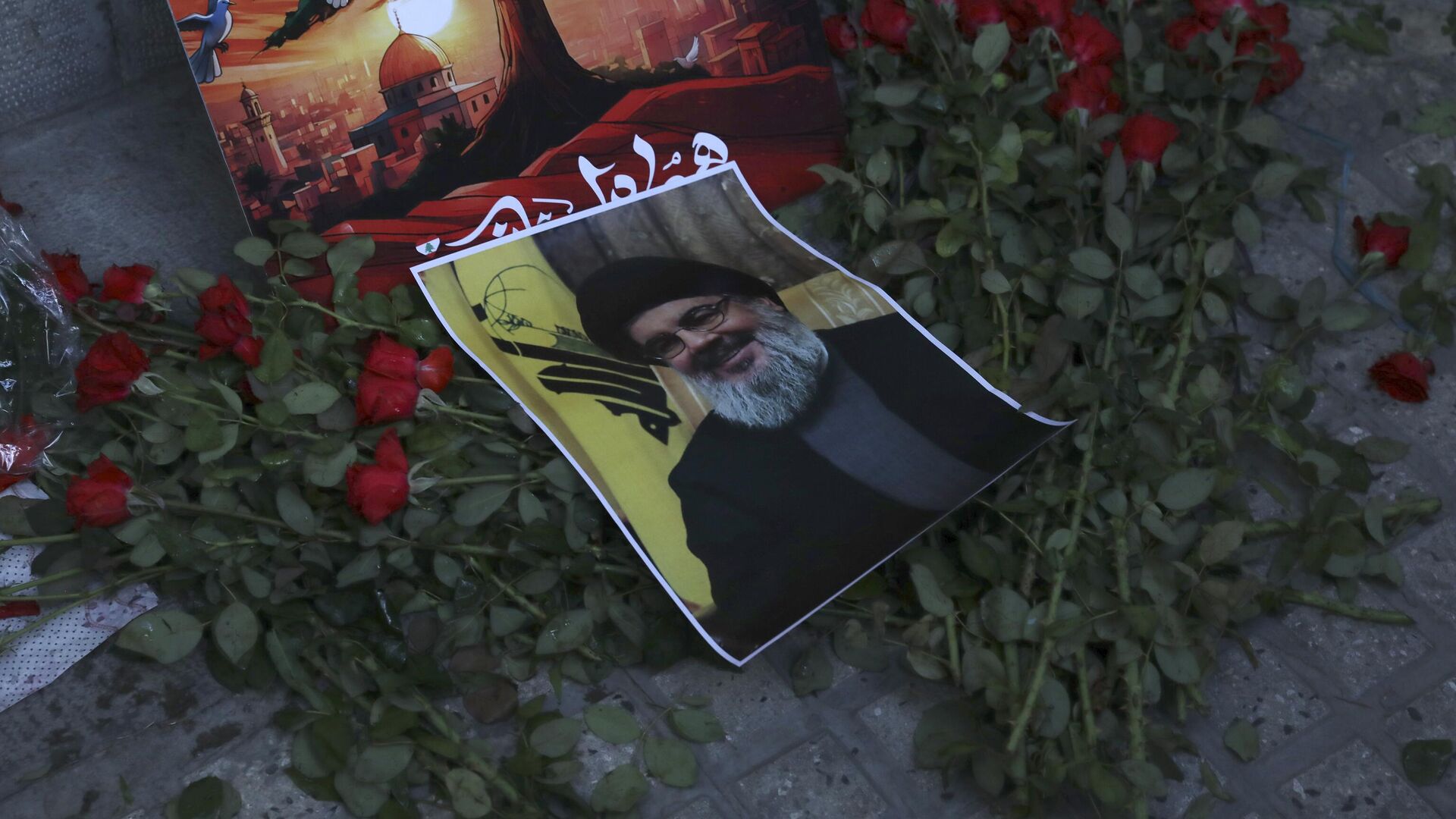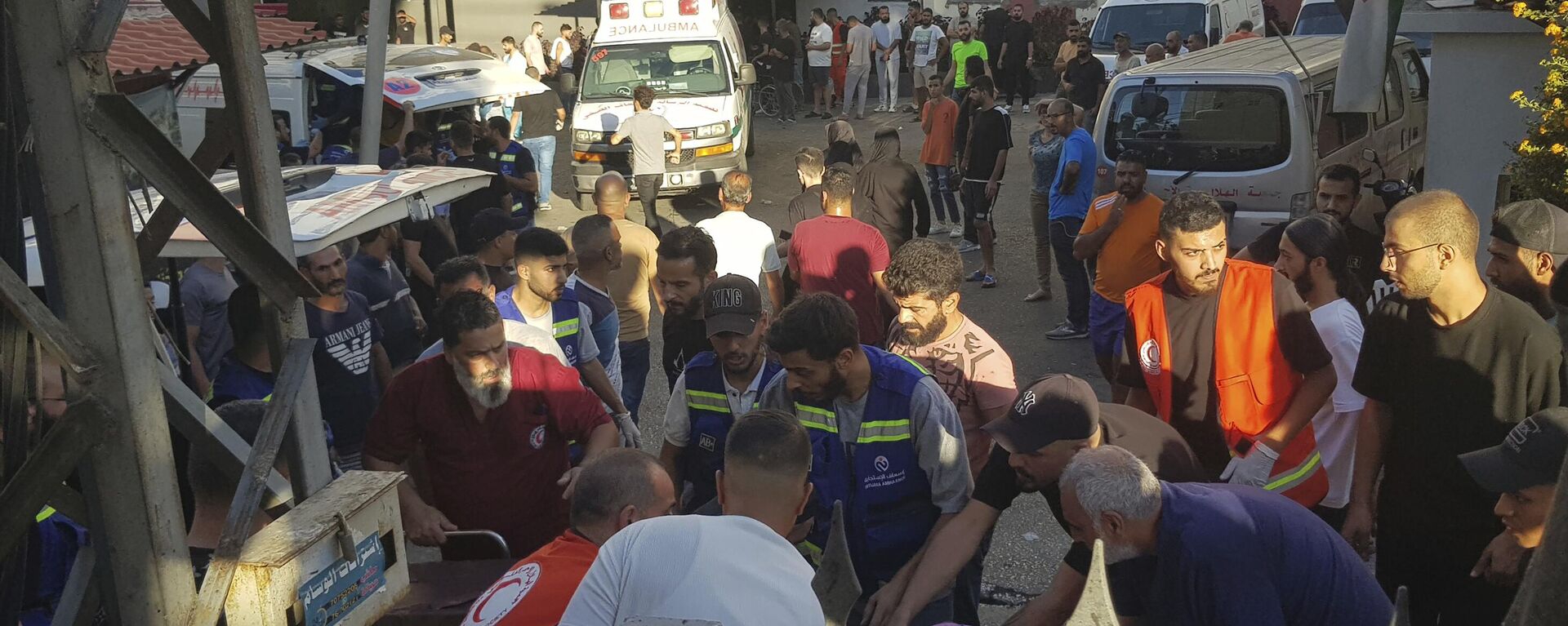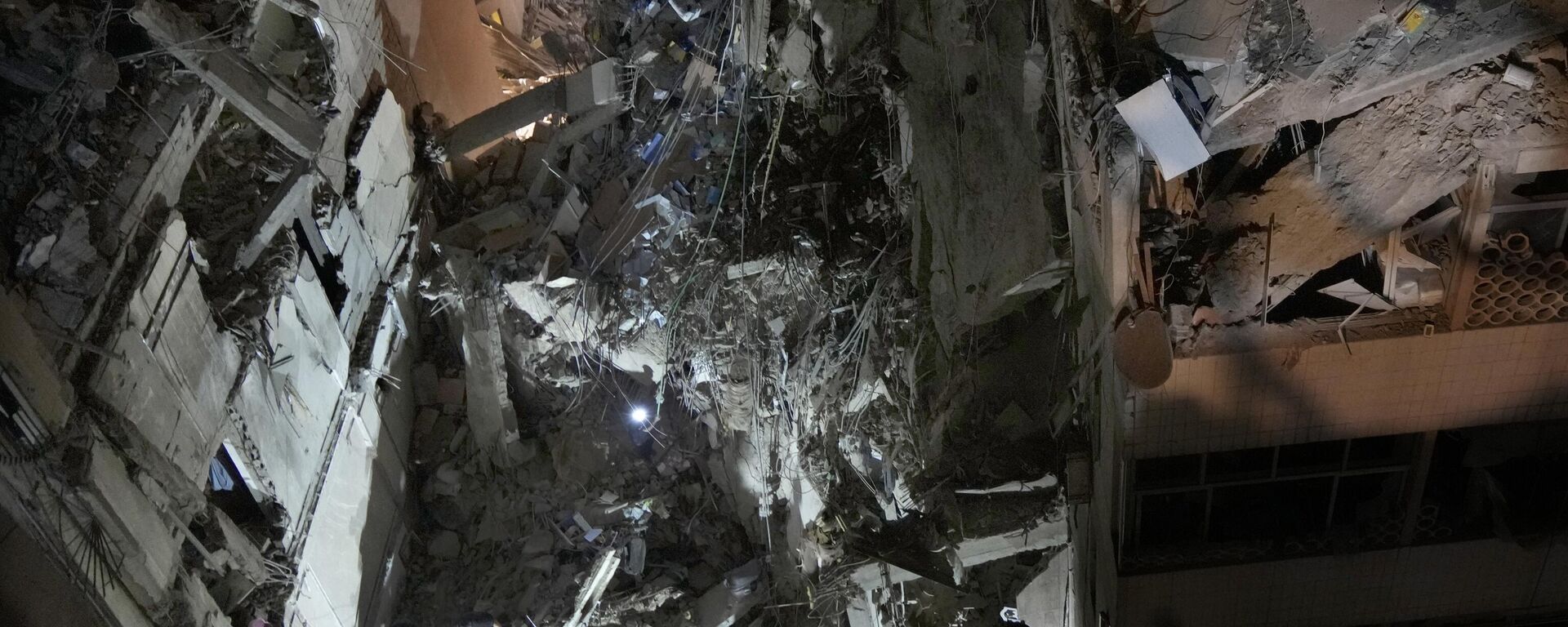https://en.sputniknews.africa/20240928/1068461982.html
Killing of Nasrallah 'Devastating Blow' That Will Escalate Violence, Lebanese Scholar Says
Killing of Nasrallah 'Devastating Blow' That Will Escalate Violence, Lebanese Scholar Says
Sputnik Africa
Lebanese political and militia movement Hezbollah has confirmed that its longtime leader Hassan Nasrallah was killed in an Israeli airstrike on Beirut on... 28.09.2024, Sputnik Africa
2024-09-28T17:13+0200
2024-09-28T17:13+0200
2024-09-30T13:42+0200
opinion
terrorist attack
israel
iran
yemen
hezbollah
houthis
middle east
attack
killing
https://cdn1.img.sputniknews.africa/img/07e8/09/1c/1068462160_0:160:3072:1888_1920x0_80_0_0_0bc7a0694179cdc55b315862600f1888.jpg
Hezbollah chief Hassan Nasrallah’s assassination marks “a devastating blow to Hezbollah” and the Iranian-led Axis of Resistance alliance and will inevitably mark a major uptick in tensions and violence in the region, veteran Lebanese Middle East affairs observer Dr. Imad Salamey says.Nasrallah’s death also comes against the background of the “substantial” damage done to Hezbollah in last week’s pager attacks, the professor said, noting that these attacks “disrupted Hezbollah’s command and control capabilities, creating significant challenges for the group to regroup and reestablish its operational structure.”While Hezbollah “remains a potent force, it will take some time for it to recover from these setbacks, both materially and strategically,” the observer believes.The IDF’s decision to code-name Friday’s attack on Nasrallah “New Order” is also an obvious reference to Israel’s ultimate goal of reshaping “the political and security dynamics in Lebanon and the broader region” to a political and security arrangement “more favorable” to Tel Aviv, according to the academic.Salamay believes Sayyed Hashem Safieddine, the chief of Hezbollah’s executive council, Nasrallah’s “number two” and the late leader's maternal cousin, is the most likely candidate to succeed him, presuming he himself hasn’t yet been targeted by Israel.“While he lacks the same public charisma as Nasrallah, his close ties to both Nasrallah and Iran make him a natural successor. However, his ability to command the same level of trust and authority among Hezbollah’s base and the broader Shiite community remains uncertain,” according to the professor.The Israeli Air Force F-16 strike on Hezbollah's HQ in a densely populated area of Beirut on Friday reportedly involved the use of over 80 bombs, including US-made 2.3-ton bunker busters, which killed at least six people and injured nearly 100 others and razed or heavily damaged at least six nearby apartment buildings.Hezbollah has vowed to continue its campaign against Israel. The Israeli military has warned that Friday's strike was "not the end of [its] toolbox" and that Tel Aviv has the means "to reach" "those who threaten the citizens of the state of Israel."The Russian Foreign Ministry "strongly condemned yet another political murder committed by Israel" and expressed concerns that the operation "will almost inevitably provoke a new surge in violence" in the region.Iranian officials have offered their condolences, saying Nasrallah's "honorable" path of resistance would continue. Yemen's Houthis and the Hamas movement have expressed similar sentiments.
https://en.sputniknews.africa/20240919/israel-set-up-shell-company-to-produce-explosive-pagers-shipped-to-lebanon-media-reports-1068333930.html
https://en.sputniknews.africa/20240801/1067704048.html
israel
iran
yemen
middle east
palestine
Sputnik Africa
feedback@sputniknews.com
+74956456601
MIA „Rossiya Segodnya“
2024
News
en_EN
Sputnik Africa
feedback@sputniknews.com
+74956456601
MIA „Rossiya Segodnya“
Sputnik Africa
feedback@sputniknews.com
+74956456601
MIA „Rossiya Segodnya“
terrorist attack, israel, iran, yemen, hezbollah, houthis, middle east, attack, killing, war, war crimes, conflict, israeli-palestinian conflict, palestine
terrorist attack, israel, iran, yemen, hezbollah, houthis, middle east, attack, killing, war, war crimes, conflict, israeli-palestinian conflict, palestine
Killing of Nasrallah 'Devastating Blow' That Will Escalate Violence, Lebanese Scholar Says
17:13 28.09.2024 (Updated: 13:42 30.09.2024) Lebanese political and militia movement Hezbollah has confirmed that its longtime leader Hassan Nasrallah was killed in an Israeli airstrike on Beirut on Friday. Sputnik asked a leading Lebanese scholar, political and international affairs observer what comes next.
Hezbollah chief Hassan Nasrallah’s assassination marks “a devastating blow to Hezbollah” and the Iranian-led Axis of Resistance alliance and will inevitably mark a major uptick in tensions and violence in the region, veteran Lebanese Middle East affairs observer Dr. Imad Salamey says.
“Nasrallah was not only the face of Hezbollah but also a figure of immense symbolic and strategic importance within the broader Iranian-led regional alliance. He has been instrumental in Hezbollah’s military and political successes against Israel, its support of [President Bashar Assad's Syria], and its backing of the Houthis in Yemen. His death represents a major moral and leadership setback, leaving a vacuum that’s difficult to fill,” Salamay, an associate professor of political science and international affairs at the Lebanese American University, told Sputnik.
Nasrallah’s death also comes against the background of the “substantial” damage done to Hezbollah in last week’s pager attacks, the professor said, noting that these attacks “disrupted Hezbollah’s command and control capabilities, creating significant challenges for the group to regroup and reestablish its operational structure.”
While Hezbollah “remains a potent force, it will take some time for it to recover from these setbacks, both materially and strategically,” the observer believes.
Dr. Salamay expects Nasrallah’s assassination to result in a sharp spike in attacks on Israel by Hezbollah and its allies to try to exact revenge, and more broadly, to potential “shifts in regional alliances, a recalibration of Iran’s strategies in Lebanon, and possibly more aggressive Israeli policies aimed at capitalizing on Hezbollah’s weakened position.”
The IDF’s decision to code-name Friday’s attack on Nasrallah
“New Order” is also an obvious reference to Israel’s ultimate goal of reshaping “the political and security dynamics in Lebanon and the broader region” to a political and security arrangement “more favorable” to Tel Aviv, according to the academic.
Salamay believes Sayyed Hashem Safieddine, the chief of Hezbollah’s executive council, Nasrallah’s “number two” and the late leader's maternal cousin, is the most likely candidate to succeed him, presuming he himself hasn’t yet been targeted by Israel.
“While he lacks the same public charisma as Nasrallah, his close ties to both Nasrallah and Iran make him a natural successor. However, his ability to command the same level of trust and authority among Hezbollah’s base and the broader Shiite community remains uncertain,” according to the professor.
As for foreign involvement in Nasrallah’s assassination, Dr. Salamay says it’s “highly unlikely that such an operation was conducted without the direct assistance and coordination of the United States and other Western intelligence agencies,” given the requirement for “extensive intelligence sharing and technological support” for “operations of this scale and precision, especially one targeting a high-value figure like Nasrallah.”
The Israeli Air Force F-16 strike on Hezbollah's HQ in a densely populated area of Beirut on Friday reportedly involved the use of over 80 bombs, including US-made 2.3-ton bunker busters, which killed at least six people and injured nearly 100 others and razed or heavily damaged at least six nearby apartment buildings.
Hezbollah has vowed to continue its campaign against Israel. The Israeli military has warned that Friday's strike was "not the end of [its] toolbox" and that Tel Aviv has the means "to reach" "those who threaten the citizens of the state of Israel."
The Russian Foreign Ministry "strongly condemned yet another political murder committed by Israel" and expressed concerns that the operation "will almost inevitably provoke a new surge in violence" in the region.
Iranian officials have offered their
condolences, saying Nasrallah's "honorable" path of resistance would continue. Yemen's Houthis and the Hamas movement have
expressed similar
sentiments.



